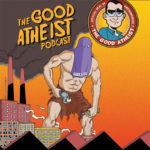This week, we confront my ‘Ageism’ and discuss ‘generational theory’ and why the world is as crappy as it is. Plus, more on the Tea Party and who comprises their ranks. It’s a must for any political junkie.
SHOW NOTES
Introduction: Lecture on Tea Party by Prof. Theda Skocpol lecture at Oxford:[5]
1980-2000 – Millennials or Generation Y
1965-1979 – Generation X
1946-1964 – Baby Boom
1925-1945 – Silent Generation
1900-1924 – G.I. Generation
What are generational differences dependent on? What factors influence generations?
First, members of a generation share what the authors call an age location in history: they encounter key historical events and social trends while occupying the same phase of life.[3]
Generations tend to go through cycles
– High: Period of strong institutions but weak individualism. Things get comfortable, but people begin to tire of such strong social obligations and the stifling of creativity and expression
– Awakening: Period when institutions are questioned. Boomers make up this demographic. Individualism is strong, (sometimes referred to as summer).
– Unraveling: Institutions are weak, distrusted, (Reagan era of individualism, ‘small government’). This is the generation, shortly after the boomers, which have now come of ‘voting age’. This generation leads inevitably to
– Crisis: (My generation) Institutional life is rebuilt, stock market crash, the 2008 market crash all happened in Crisis eras. These are moments that redefine national identities (perhaps global identities with the coming of the Internet. Rising civic engagement, (winter).
In these times, Archetypes appear –
Prophets: come of age as self-absorbed young crusaders of an Awakening, focus on morals and principles in midlife, and emerge as elders guiding another Crisis
Nomads: born during an Awakening, a time of social ideals and spiritual agendas, when young adults are passionately attacking the established institutional order. These were shrewd realists who preferred individualistic, pragmatic solutions to problems.
Heroes: Tend to be more militaristic, strong political leaders. They are overly confident, having grown up as cocky young adults during a time of crisis. This tends to shape them into leaders.
Artistic: The strong, political overbearingness makes the previous generation more prone to compromise and pragmatism.
Prophet Nomad Hero Artist
High Childhood Elderhood Midlife Young Adult
Awakening Young Adult Childhood Elderhood Midlife
Unraveling Midlife Young Adult Childhood Elderhood
Crisis Elderhood Midlife Young Adult Childhood
We share more in common with the old. Hence, now the fashion of our grandfathers become present day affectations. What is old is fresh again. We reject those values of the midlife of our parents, cling to those of our grandparents instead, but influenced by the different phases.
Voting Statistics
Age Size Voters Percent
18-20 11.7 m 2.05m (17%)
20-24 15.6m 4m (24%)
25-34 41.2m 12.85m (31%)
35-44 39.9m 17.19m (43.1%)
45-65 80m 43.9m (54.4%)
65-99 39m 23.7m (60.4%)
If Generational theory is correct, that would mean 66 million people are 55 or older
Voting and registration rates tend to increase with age. In the United States in 2010, only 21 percent of 18 to 24 year old citizens voted, compared with 61 percent of those 65 and older.
Many Generation Xers came of age during the Reagan-Bush years (1980 to 1992) or the ‘Republican Revolution’ marked by the 1994 midterm elections. Today’s Generation Y has reached maturity in a time period largely marked by the administration of George W. Bush, and certainly for many the nascent Obama administration is a major formative factor in their political orientation.[1]
Perhaps the most striking change since 2004 has come among voters born between 1956 and 1976 — the members of Generation X and the later Baby Boomers. People in this age group tended to be more Republican during the 1990s, and the GOP still maintained a slight edge in partisan affiliation among Gen X and the late boomers in 2004 (47% identified with or leaned toward the GOP while 44% described themselves as Democrats or leaned Democratic).[2]
Among racial demographics, Asians have the worse voting record (30%), as did Hispanics (31%)
I hate the 33-47 year old Generation (Gen X) and The Silent (who share both politically conservative views, and who are now overwhelming voting majorities. Their combined voting strength will undoubtedly lead to a crisis.
Americans who tend to have more income, slightly more educated than average, and of 65- years and older increasingly dissatisfied with these institutions that they nevertheless have benefitted from, considering their wealth.
Coddled children of the Post War high and the coddled children of hippies who went the other spectrum politically.
Misc:
– Cool Pumpkin carvings [6] [7]
– Very unemployed people less likely to get work [8]
[1] http://www.gallup.com/poll/118285/democrats-best-among-generation-baby-boomers.aspx
[2] http://pewresearch.org/pubs/813/gen-dems
[3] http://en.wikipedia.org/wiki/Strauss-Howe_generational_theory#Defining_a_generation
[4] http://en.wikipedia.org/w/index.php?title=File:Uspop.svg&page=1
[5] http://podcasts.ox.ac.uk/tea-party-and-remaking-republican-conservatism-audio
[6] http://www.examiner.com/slideshow/ray-villafane-s-pumpkins?cid=PROG-redesign-bottom-dontmiss-2-Slideshow-RayVillafanesPumpkins101212#slide=54003821
[7] http://www.facebook.com/l.php?u=http%3A%2F%2Fwww.examiner.com%2Fslideshow%2Fray-villafane-s-pumpkins%3Fcid%3DPROG-redesign-bottom-dontmiss-2-Slideshow-RayVillafanesPumpkins101212%23slide%3D54003821&h=9AQGlbt8I
[8] http://jaredbernsteinblog.com/without-work-work-based-welfare-does-not-fare-well/

